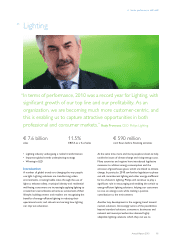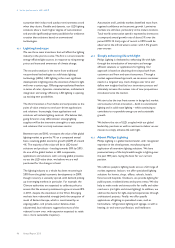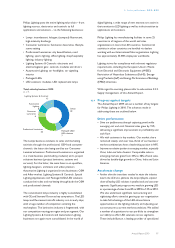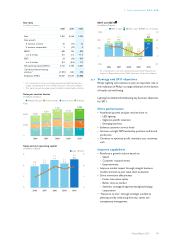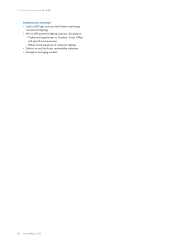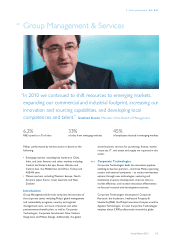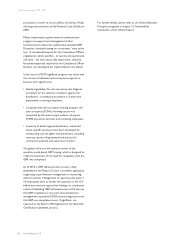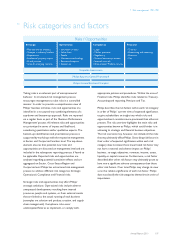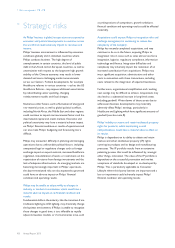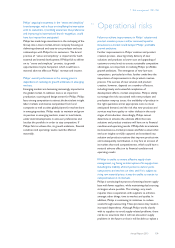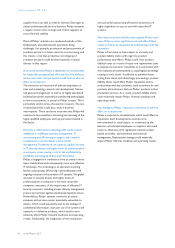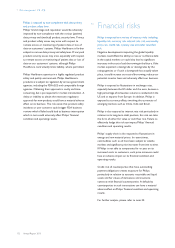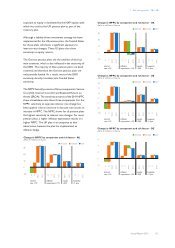Philips 2010 Annual Report Download - page 105
Download and view the complete annual report
Please find page 105 of the 2010 Philips annual report below. You can navigate through the pages in the report by either clicking on the pages listed below, or by using the keyword search tool below to find specific information within the annual report.7 Risk management 7.1 - 7.1
Annual Report 2010 105
The quality of Philips’ systems of business controls and the
findings of internal and external audits are reported to and
discussed in the Audit Committee of the Supervisory
Board. Internal auditors monitor the quality of the
business controls through risk-based operational audits,
inspections of financial reporting controls and compliance
audits. Audit committees at the corporate level (Finance
and IT/Supply) and the sector level (Healthcare, Lighting,
Consumer Lifestyle, Group Management & Services) meet
quarterly to address weaknesses in the business controls
infrastructure as reported by internal and external
auditors or revealed by self-assessment of management,
and to take corrective action where necessary. These
audit committees are also involved in determining the
desired company-wide internal audit planning as approved
by the Audit Committee of the Supervisory Board. An in-
depth description of Philips’ corporate governance
structure can be found in chapter 12, Corporate
governance, of this Annual Report.
Philips Business Control Framework
The Philips Business Control Framework (BCF), derived
from the Committee of Sponsoring Organizations of the
Treadway Commission (COSO) framework on internal
control, sets the standard for risk management and
business control in Philips. The objectives of the BCF are
to maintain integrated management control of the
company’s operations, in order to ensure integrity of the
financial reporting, as well as compliance with laws and
regulations.
As part of the BCF, Philips has implemented a global
standard for internal control over financial reporting
(ICS). The ICS, together with Philips’ established
accounting procedures, is designed to provide reasonable
assurance that assets are safeguarded, that the books and
records properly reflect transactions necessary to permit
preparation of financial statements, that policies and
procedures are carried out by qualified personnel and that
published financial statements are properly prepared and
do not contain any material misstatements. ICS has been
deployed in all main reporting units, where business
process owners perform an extensive number of
controls, document the results each quarter, and take
corrective action where necessary. ICS supports sector
and functional management in a quarterly cycle of
assessment and monitoring of its control environment.
Findings of management’s evaluation are reported to the
Board of Management.
As part of the Annual Report process, management’s
accountability for business controls is enforced through
the formal issuance of a Statement on Business Controls
and a Letter of Representation by sector and functional
management to the Board of Management. Any
deficiencies noted in the design and operating
effectiveness of controls over financial reporting which
were not completely remediated are evaluated at year-
end by the Board of Management. The Board of
Management’s report, including its conclusions regarding
the effectiveness of internal control over financial
reporting, can be found in section 13.1, Management’s
report on internal control, of this Annual Report.
Philips General Business Principles
The Philips General Business Principles (GBP) govern
Philips’ business decisions and actions throughout the
world, applying to corporate actions and the behavior of
individual employees. They incorporate the fundamental
principles within Philips for doing business.
The GBP are available in most of the local languages and
are an integral part of the labor contracts in virtually all
countries where Philips has business activities.
Responsibility for compliance with the principles rests
primarily with the management of each business. Every
country organization and each main production site has a
compliance officer. Confirmation of compliance with the
GBP is an integral part of the annual Statement on
Business Controls that has to be issued by the
management of each business unit. The GBP incorporate a
whistleblower policy, standardized complaint reporting
and a formal escalation procedure.
The global implementation of the One Philips Ethics
hotline seeks to ensure that alleged violations are
registered and dealt with consistently within a company-
wide system. To drive the practical deployment of the
GBP, a set of directives has been published, which are
applicable to all employees. There are also separate
directives which apply to specific categories of employees
(e.g. the Supply Management Code of Ethics and Financial
Code of Ethics, refer to www.philips.com/gbp).
In January 2010 an updated and extended version of the
GBP Directives came into force, reflecting the latest
developments in codes of conduct and business integrity
legislation. Key new elements in this edition include a
more detailed and explicit definition of the anti-
corruption/anti-bribery guidelines and directives (in
accordance with the latest FCPA and OECD
requirements) and a number of changes designed to
further clarify the existing GBP Directives. All employees
performing important financial functions must comply
with the Financial Code of Ethics which contains, amongst
other things, standards to promote honest and ethical
conduct, as well as full, accurate and timely disclosure


